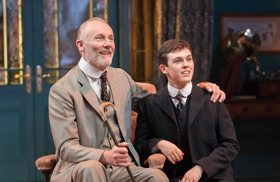Review: THE WINSLOW BOY, Richmond Theatre

![]() On the face of it, a play based upon a 13-year-old boy being expelled from his naval college for allegedly stealing a five-shilling postal order does not sound like the stuff of captivating drama. However, in the masterly hands of Terence Rattigan, this story does indeed enthral and quietly impress.
On the face of it, a play based upon a 13-year-old boy being expelled from his naval college for allegedly stealing a five-shilling postal order does not sound like the stuff of captivating drama. However, in the masterly hands of Terence Rattigan, this story does indeed enthral and quietly impress.
Based on a true story, young Ronnie Winslow denies the theft of the postal order and sets about a two-year battle led by his father to clear his son's name. The family face social ostracisation and acute financial difficulties when the case becomes a national scandal.
The overriding themes of The Winslow Boy are justice and familial loyalty. This highly-charged drama about morality and social hypocrisy demonstrates fully the gift Rattigan had for acerbic wit and exposing the flaws of society.
The scene where Sir Robert Morton interrogates young Ronnie is a masterclass in dramatic writing. There are wider implications than just a father's fight for his son; the play demonstrates a sharp insight into the injustices within society and the human condition as a whole.
Aden Gillet as Arthur Winslow is passionate and totally convincing as a father fighting for his son, his reputation and for what is inherently right and just. His commitment and dedication to his cause is admirable and ultimately means sacrificing his wealth, his health and his family's well-being. The interactions between Gillet and his son, played by Misha Butler, are tender and beautifully judged.
There is also a radical fighting spirit shown in Ronnie's suffragette sister Catherine, played wonderfully by Dorothea Myer-Bennett, who is always appropriately dressed in green. She displays wit and energy, with a captivating stage presence.
Her interactions with QC Robert Morton, played with icy intent by Timothy Watson, are well handled, with just enough subtle flirtation to suggest future romance.
Tessa Peake-Jones makes the best of an underwritten part as mother Grace, who shows deep concern for her family in the face of this unexpected challenge. Peake-Jones struggles to convey much beyond a stereotype of an upper-middle class Edwardian wife and mother. Theo Bamber is amusing but a little too ebullient as eldest brother Dickie Winslow.
The play looks beautiful; from the elegant teal-coloured drawing room with its high ceiling and fashionable curtains to the sumptuous dresses, Michael Taylor's set and costume design is both appropriate and chic.
There are some important reasons why director Rachel Kavanaugh perhaps chose to revive this play now: the centenary of both the women's suffrage movement and the First World War. The fact that the boy the play is based upon died at just 19 in the first Battle of Ypres adds to the poignancy.
Kavanaugh has cleverly made the play feel very current and extracts a huge amount of wit from the cast, making this a thoughtful, moving and highly entertaining production.
The Winslow Boy is at Richmond Theatre until 12 May
Photo Credit: Alastair Muir
Reader Reviews
Videos

